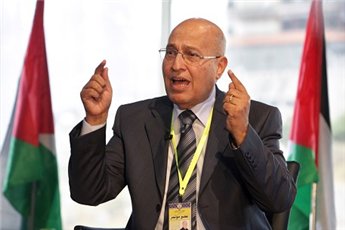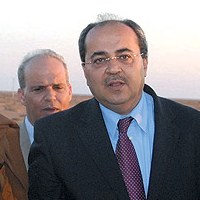![]()
Wed, July 27, 2011 | Rubin Reports | By Barry Rubin
Palestinian “Moderate” Shows Why Real Peace is Impossible At Present
Nabil Shaath has given a fascinating and insightful interview that is well worth analyzing. But first let’s take a look at who Shaath is.
Supposedly, he is the archetypal Palestinian moderate. There was a time when the Western media ridiculed the Israeli declaration that he was a secret Fatah member. When Israel agreed to negotiate with non-PLO Palestinians, the PLO put his name forward although it knew, of course, that he was no such thing. Peace processors ridiculed Israel’s refusal to accept him.
Since 1994, he has held several high positions. He has been credibly accused, by Fatah militants who criticized Yasir Arafat’s corruption, of taking a lot of Palestinian Authority money for himself and his family.
Nevertheless, it is reasonable to call Shaath as moderate as anyone in the PA’s leadership, more moderate than the Fatah leadership. And what does Shaath say in an interview on July 13, 2011:
Nabil Shaath: “The recognition of a [Palestinian] state…will make many things possible in the future. Eventually, we will be able to sign bilateral agreements with states, and this will enable us to exert pressure on Israel. At the end of the day, we want to exert pressure on Israel, in order to force it to recognize us and to leave our country. This is our long-term goal.”
In other words, the goal is not to come to a deal with Israel but to gain recognition from other countries which will pressure Israel and force it to give the PA what it wants. (Incidentally, this is pretty much Yasir Arafat’s strategy from 30 years ago, though he was using a higher level of violence in that process.)
But what does the phrase “leave our country” mean as a “long-term goal?” Does “leave our country” mean just the West Bank and east Jerusalem (pre-1967 borders without mutually agreed swaps) or wiping Israel off the map and replacing it with an Arab Muslim state? It’s ambiguous, isn’t it? So perhaps Shaath is a moderate (as advertised in the Western media? In this case, though, Shaath gives us an answer.
“[The recent French proposal, quite frienly to the Palestinians generally] reshaped the issue of the “Jewish state” into a formula that is also unacceptable to us — two states for two peoples. They can describe Israel itself as a state for two peoples, but we will be a state for one people. The story of “two states for two peoples” means that there will be a Jewish people over there and a Palestinian people here. We will never accept this — not as part of the French initiative and not as part of the American initiative. We will not sacrifice the 1.5 million Palestinians with Israeli citizenship who live within the 1948 borders, and we will never agree to a clause preventing the Palestinian refugees from returning to their country. We will not accept this, whether the initiative is French, American, or Czechoslovakian.”
In other words, Shaath, one of the most important and relatively moderate Palestinian Authority leaders, is against a two-state solution. First, there will be a Palestinian state “for one people,” that is an Arab, Muslim state. But there can be no recognition of Israel as a Jewish state because that implies a permanent peace. Shaath and the Palestinian leadership almost unanimously seek a second stage in which the “Palestinians with Israeli citizenship” plus the “returning…to their country” of Palestinian refugees will turn Israel into an Arab Muslim Palestinian part of Palestine.
This is merely a restatement of the “two-stage” solution of the PLO adopted forty years ago. No real progress in 40 years, despite all the disasters and potential lessons seen by the Palestinians! I have been very skeptical about the peace process, especially for the last 15 years, but I don’t think I’ve ever read anything that has so brought home to me why this is such a mirage because Shaath is so open about it and if anyone could be expected to support a real two-state solution it would be him.
Will anyone read and understand what Shaath is saying who believes that peace is at hand and that the Palestinian leadership is eager for a two-state solution?
Incidentally, Shaath also accurately reflected what many Arabs — including relatively moderate ones — think about U.S. policy. He sees Obama as weak:
“President Obama will not make his presence felt in the coming 14 months…In practical terms, the US does not play a role any more in the Middle East, although it does not want to acknowledge or accept this…The US has no real presence.”
This observation is equally devastating. And again will it penetrate at all into much of the mass media? Guess you should be congratulating yourself that you read CrethiPlethi.



 RSS
RSS











#Palestinian “Moderate” Shows Why Real Peace is Impossible At Present | #Israel #Shaath http://bit.ly/oclLJG
#Palestinian “Moderate” Shows Why Real Peace is Impossible At Present | #Israel #Shaath http://bit.ly/oclLJG
#Palestinian “Moderate” Shows Why Real Peace is Impossible At Present | #Israel #Shaath http://bit.ly/oclLJG
#Palestinian “Moderate” Shows Why Real Peace is Impossible At Present | #Israel #Shaath http://bit.ly/oclLJG
[…] was made clear yet again last month when senior PA “negotiator” Nabil Sha’ath said in an interview with Arabic News Broadcast, “The story of ‘two states for two peoples’ means that […]